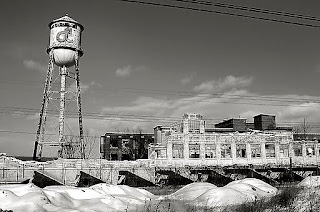
Living in Philadelphia, and thinking a lot about economic development in Philadelphia in my day job, it's easy to get focused on the trials and travails of the big, post-industrial city. 1950-2000 for Philly wasn't as bad as it was for Detroit, but it was pretty brutal nonetheless: in 1950, we were at a population of 2 million, and bracing ourselves infrastructurally for growth up to 2.5 mil and counting, and yet by 2000, we were at 1.5 mil instead. What happened, of course, was decentralization: people, jobs, and shopping moved to the burbs, facilitated by the mechanization of industry and by subsidized mortgages and highways, and creating a vicious cycle of more crime, greater social service needs, and higher taxes in our rapidly emptying Rust Belt cities.
What has stemmed and even reversed this tide in the past decade has been the emergence of trends that actually work in favor of older big cities. Two big ones are that we have the transit infrastructure in place to capitalize on a future world in which carbon is dearer, and we have the academic/research/medical institutions that draw the funding/brains/jobs of the new knowledge economy. Cities that were left for dead ten years ago, like Pittsburgh and Baltimore and Philadelphia, can argue with a straight face that their best days are ahead of them.
What I am beginning to realize is that the places that face the most challenges are not the bigger cities but the mid-size ones. When you are of a population of 30,000 to 100,000, you are on the wrong end of all of those decentralization trends I spoke of above, and yet you probably lack the scale to justify things like fixed-rail systems and research universities and regional hospitals. Depending on what your bread-and-butter industries were in the middle of last century, you could have major infrastructural wreckage to have to try to repurpose, and major talent mismatches in terms of what you're good at versus what the global economy values.
I have some ideas as to the way forward for the Wilkes-Barres (population ~ 40,000) and the Readings (population 80,000) of the world, but they're still baking; although if you know me, you can probably guess what sorts of concepts I'm gravitating towards. In the meantime, you can read what Ryan Avent has to say over at the Bellows; I found his recent post, "The Urban Economy,"to be resonant with how I'm marinating on the topic.
.jfif)

2 comments:
I visited a friend in Baltimore last week and was amazed by the unmet potential in her neighborhood. She lives exactly one block from the giant Johns Hopkins medical complex and a metro stop. Yet almost all of the row houses on her street are boarded up. The local Chinese take-out place won't deliver to her house after dark. I understand the concerns with gentrification, but surely any use is better than abandonment.
I'm optimistic like you are for cities like Baltimore. But I still couldn't help asking why this major institution has not generated more investment in its own neighborhood yet. Maybe its coming.
Daniel -
Perception of crime goes a long way (darn The Wire!). And most people are still pretty fussy when it comes to who their kids'll be going to school with.
But a lot of the painful transitions cities have had to go through are over, energy/environmental realities will favor denser and transit-served locations, and the knowledge economy and an aging population mean places with big academic/medical/research institutions stand to gain. So I have to think that Baltimore will see better days than now.
Now: will the gains be uniformly distributed? And will it return to being the seventh most populous city in the US, like it was in 1910? I'm going to go with "No" and "No." But I have to think the area around JHU is a value play, circa 2010.
Thanks for sharing.
Post a Comment